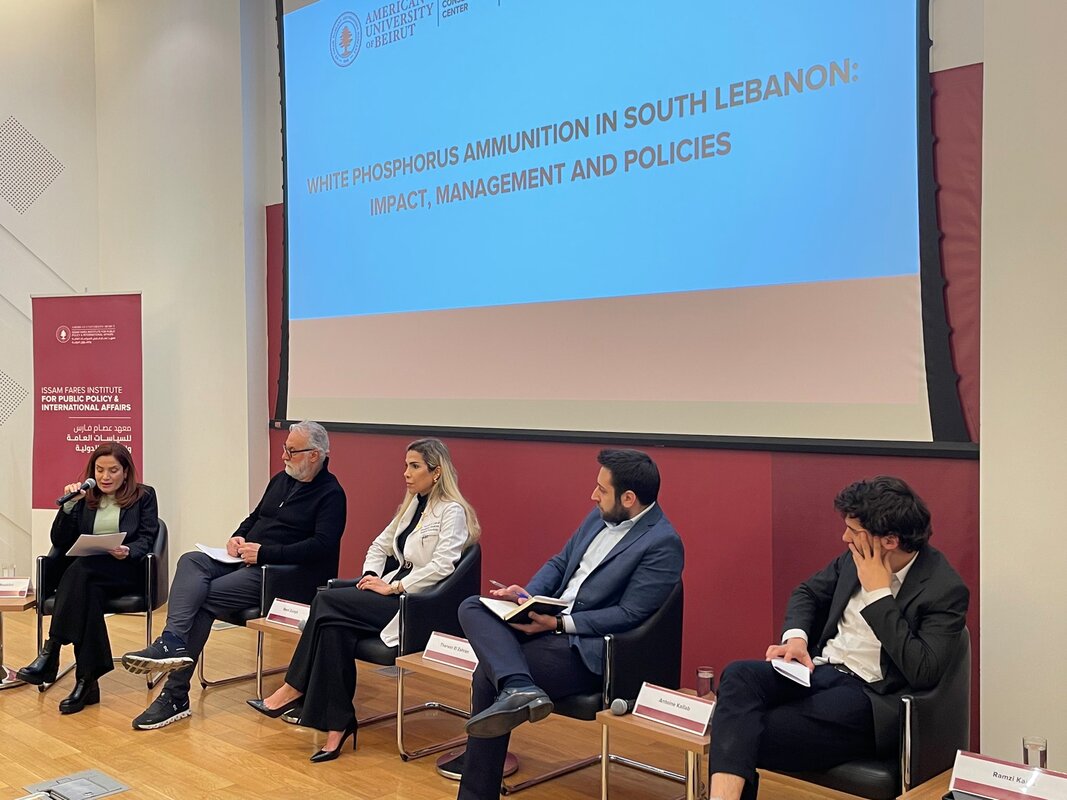|
The American University of Beirut's Issam Fares Institute for Public Policy and International Affairs, Nature Conservation Center, and Faculty of Medicine, hosted a panel discussion titled "White Phosphorus Ammunition in South Lebanon: Impact, Management, and Policies." The panel included IFI Director Joseph Bahout, Assistant Professor of Emergency Medicine Thawrat El Zahran, Professor of Ecosystem Management & Interim Director of the Palestine Land Studies Center Rami Zurayk, Associate Director at AUB-NCC Antoine Kallab, and Lebanon Researcher at Human Rights Watch Ramzi Kaiss. The discussion, delving into multifaceted issues surrounding the use of white phosphorus in the region, was moderated by Suzanne Baaklini, a journalist from l'Orient Le Jour. In his opening remarks, Bahout underscored the significance of informed policy discussions and decisions facilitated by the panel's expertise. Additionally, he highlighted the parallel urgency of addressing crises in South Lebanon and Gaza, emphasizing the commitment of IFI to engage actively with unfolding issues and express solidarity with mobilization efforts.
Kallab outlined the immediate steps taken by his team amidst the hostilities in South Lebanon. Stressing the imperative need for a thorough investigation into the use of white phosphorus. Kallab shed light on the long-term environmental repercussions of phosphorus residue in the soil, advocating for measures to combat its usage. He also discussed Israel's broader agenda of rendering South Lebanon uninhabitable, with white phosphorus exacerbating internal displacement and economic hardship. El Zahran focused on the clinical effects of white phosphorus exposure, emphasizing its dual nature as both a thermal and chemical agent. She highlighted management strategies, emphasizing the importance of tailored protocols, protective equipment, and public awareness campaigns to mitigate health risks. Meanwhile, Zurayk, noted the scarcity of research on white phosphorus. He revealed findings showing elevated levels in soil samples in both Gaza and Lebanon. Contextualizing Israel's tactics within a broader strategy of environmental degradation, he linked white phosphorus use to deliberate disruptions such as deforestation and non-native species planting. Zurayk urged the need for comprehensive scientific research on phosphorus dynamics in soil and groundwater, cautioning against fixating solely on white phosphorus and advocating for a holistic approach to addressing complex challenges. Finally, Ramzi Kaiss highlighted prevalent misconceptions surrounding white phosphorus, highlighting its indiscriminate use over populated areas and loopholes in international legislation. He discussed potential legal avenues against Israel for violations in South Lebanon, proposing engagement with the International Criminal Court, contingent on the government's political will to pursue justice. The panel underscored the urgent need for coordinated efforts to address the multifaceted challenges posed by white phosphorus in South Lebanon. It also called for a comprehensive investigation, tailored management strategies, and legal action to ensure accountability and prevent further harm to communities and the environment. Access the full recording here! Comments are closed.
|
Archives
July 2024
|

